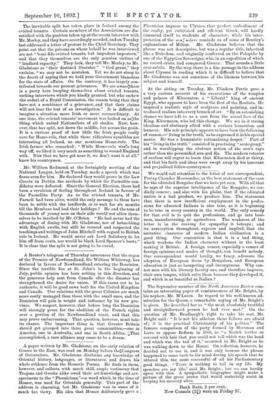A paper written by Mr. Gladstone, on the early relation
of Greece to the East, was read on Monday before theiCongress of Orientalists. Mr. Gladstone disclaims any knowledge of Oriental history, languages, or literatures, and draws his whole evidence from the Homeric Poems. He finds in them, however, and collects with much skill, ample testimony that Trojans and Greeks alike owed their art-knowledge and art- specimens to the " Pheenicians,"—a word which, in the time of Homer, was used for Orientals generally. This part of the address is charming, but Mr. Gladstone was in some of it much too viewy. His idea that Homer deliberately gave a
Phoenician impress to Ulysses, that perfect embodiment of the crafty, yet cultivated and efficient Greek, will hardly commend itself to students of character; while his inter- pretation of the alic< av8pwy reminds us of some of Bentley's explanations of Milton. Mr. Gladstone believes that the phrase was not descriptive, but was a regular title, inherited like a Dukedom, and originally conferred on the Pelopithe by one of the Egyptian Sovereigns, who, in an expedition of which no record exists, had conquered Greece. That sounds a little over-subtle. By-the-way, there is a fine passage in the address about Ulysses, in reading which it is difficult to believe that Mr. Gladstone was not conscious of the likeness between his subject and himself.


































 Previous page
Previous page